Dental Crowns Frisco
Long-Term Smile Restoration

Dental crowns or dental caps are restorations that completely encircle the tooth or dental implant. We are happy to offer high-quality restorative and cosmetic treatments, including the fabrication of excellent-looking, longer-lasting, and extremely strong dental caps. If you have damaged crowns, our skilled experts can fabricate one for you. Dr. Gadhiya in Frisco, TX, can easily place a tooth-colored crown that lasts for years. If you’re ready to do something about your decayed tooth, call our office to schedule an appointment with us today.
Why Choose Highland Oak Dental for Dental Crowns?
- Dental Team Will Maximize Your Benefits
- Comfortable, State-of-the-Art Dental Facility
- iTero Scanner Used to Create Faster Dental Impressions
Types of Dental Crowns
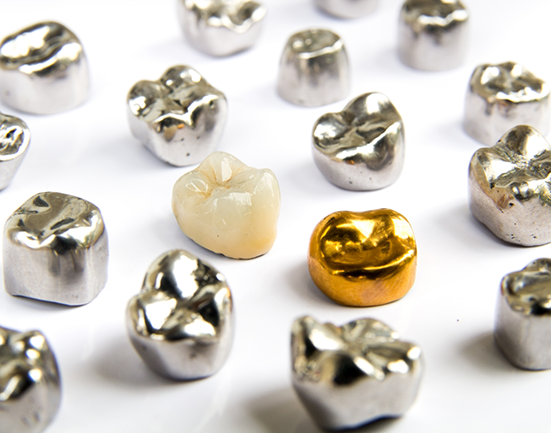
We offer various types of dental crowns, including:
All-Metal
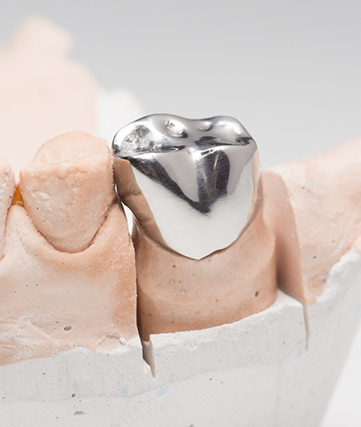
These are primarily made with metal alloys. It is the strongest type of crown, but it lacks aesthetics. Thus, it is rarely used in the front of the mouth but instead, it is reserved for the posterior teeth located toward the back of the mouth, which is not typically visible.
All Porcelain
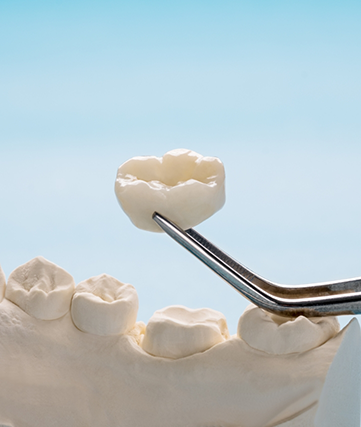
These have the best looks since they are prepared from tooth-colored ceramics. Porcelain caps are recommended for patients who are extremely conscious about their looks.
Metal-Ceramic
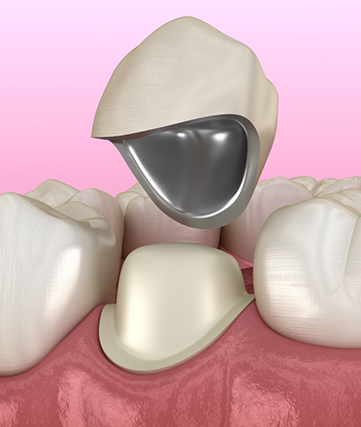
These combine the benefits of metal and porcelain caps. They contain a metallic alloy framework over the layer of porcelain where it will be attached. Highland Oak Dental also have different types available, based on their intended duration of use.
Permanent
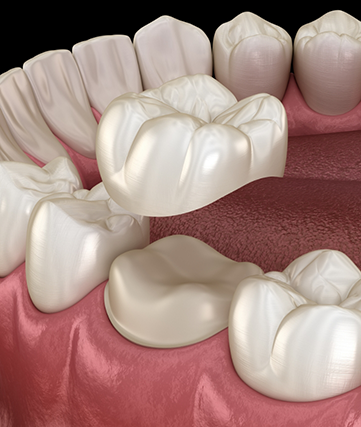
These are used for permanently restoring a crooked or chipped tooth with one post. It is cemented into place with the use of dental adhesive. Only the dentist will be able to remove it when repairs are needed.
The Dental Crown Procedure

Preparing for a dental crown will normally take two appointments. The first will involve making the tooth, and the second will include installing your permanent crown. Here’s how it is done:
- During your first appointment, your dentist will take X-rays of your teeth to check the roots of the tooth that will get the crown and its surrounding bone. When there is extensive decay, injury, or infection to the tooth pulp, your dentist will perform endodontic therapy (a root canal) first. If there is enough tooth to be saved, your dentist will simply get rid of the decayed part to perform crownlay – a more conservative restoration that is a combination of a crown and onlay – instead of placing a full crown.
- The tooth and gum tissue will be numbed using anesthesia, so you won’t feel pain when the dentist performs the next steps.
- Your dentist will prepare the tooth, getting as much material as possible, to make sure the crown will fit. If the large area of the tooth is missing due to decay or damage, they will use a filling material to build up the tooth and provide better support for the crown.
- They will then make a dental impression of the prepared tooth by using a putty or dental paste. Through modern CAD/CAM dentistry, they will use a digital scanner to create the impression of the teeth. These impressions are sent to the laboratory to be manufactured. You’ll then be required to wear a temporary crown until the permanent crown is finished. The process of manufacturing the crown will take from one to three weeks.
On your next visit, your dentist will remove the temporary crown before checking the fit and color of the permanent one. If the crowns match the color of your smile, you will then be injected with anesthesia to numb the tooth and safely put the new crown in place. Learn more about diastema smile.
Dental Crown FAQs
How long do dental crowns last?
The average lifespan of crowns can last up to 15 years. High-quality crowns can last more than 25 years with proper care and maintenance. You do not need to worry, as Highland Oak Dental is pleased to produce only the highest-quality dental crowns available.
Is it painful to have a crown put on your tooth?
No. The treatment is pain-free. A local anesthetic will be administered by Dr. Prakash Gadhiya before filling the cavity or placing it with a crown. You can expect, however, to feel soreness or discomfort after the local anesthetic wears off, which will dissipate within a day or two.
Can your teeth rot under a crown?
Yes. The tooth can decay under a crown particularly if the patient is not practicing proper oral hygiene. Dental crowns protect weak teeth and if the bacteria are allowed to grow under the gums, they will turn into plaque and tartar before eventually causing tooth decay. If patients do not visit their dentist regularly, they won’t notice the tooth rotting under the crown until it’s too late. Learn more about dental crowns by visiting Highland Oak Dental office.








